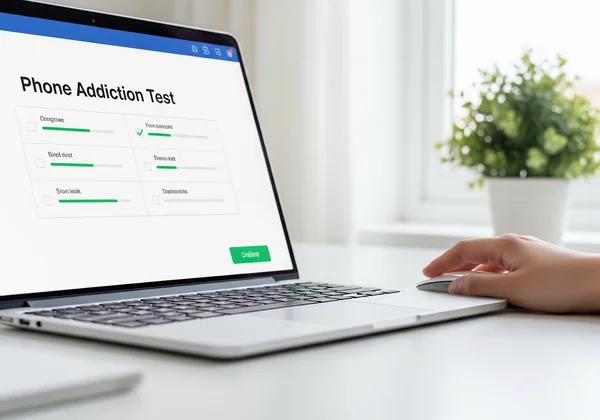Am I Addicted to My Phone? Take a Phone Addiction Test
August 26, 2025 | By Juliana Pace
Are you constantly glued to your screen, feeling an undeniable pull towards your smartphone? Does the thought of being without it for even a few hours fill you with a sense of unease? In today's hyper-connected world, it's easy for casual phone use to spiral into something more problematic. You might be asking yourself, Am I addicted to my phone? This article will help you identify the common signs of problematic smartphone use and guide you towards a clearer understanding of your digital habits with a confidential phone addiction test. If you're ready to take an assessment, this is your first step.
Understanding Problematic Smartphone Use & Internet Addiction Signs
Before we dive into specific behaviors, it's important to understand what separates healthy phone use from a potential problem. It isn't just about the number of hours you spend online; it's about the impact that time has on your life. Problematic smartphone use, often linked with broader internet addiction, occurs when your device usage becomes compulsive, causing significant impairment or distress in your daily activities, work, school, or relationships.
This isn't a matter of willpower. Powerful psychological mechanisms are at play, making it difficult to disconnect. Understanding these forces is key to recognizing the patterns in yourself and taking back control.
The Compulsive Need to Check: Is It Nomophobia?
Have you ever felt a phantom vibration in your pocket, or a wave of anxiety when you realize you've left your phone at home? This feeling has a name: Nomophobia, or "no-mobile-phone phobia." It’s a modern form of anxiety driven by the fear of being disconnected from the digital world. This isn't just a quirky habit; it’s a genuine stress response. The compulsive need to check for notifications, messages, or updates is a primary indicator that your relationship with your device might be tipping into an unhealthy zone.

The Brain's Reward System: Dopamine and Digital Habits
Why is it so hard to put the phone down? The answer lies in your brain's chemistry. Every time you receive a like, a comment, or a new message, your brain releases a small amount of dopamine—a neurotransmitter associated with pleasure and reward. Apps and social media platforms are expertly designed to leverage this reward system. The unpredictable nature of these rewards creates a powerful feedback loop, much like a slot machine, compelling you to keep scrolling and checking for that next little "hit." Your digital habits are being shaped by this constant, low-level neurological conditioning.

7 Key Indicators: How to Identify Excessive Phone Use
So, how can you tell if your phone use has crossed the line? Recognizing the signs is the most crucial step toward understanding your behavior. Here are seven key indicators that your smartphone usage may be becoming excessive. See how many of these feel familiar.
Neglecting Responsibilities for Screen Time
A clear red flag is when your phone use starts interfering with your essential obligations. This could mean missing deadlines at work because you were lost in a social media feed, neglecting household chores to play a mobile game, or performing poorly in school because you stayed up all night watching videos. When your digital life consistently takes priority over your real-world responsibilities, it's a sign that your usage is no longer under your control. If this sounds familiar, it might be time to take a phone addiction test more deeply.
Increased Use Over Time or Failed Attempts to Cut Back
Do you find yourself needing more and more screen time to feel satisfied? This is known as tolerance, a classic feature of addictive behaviors. Perhaps you started by checking your phone for a few minutes each hour, but now you find yourself online for extended periods. You might have even tried to set limits or do a "digital detox," only to find yourself falling back into old patterns within days or even hours. These failed attempts to cut back are a strong signal that your phone use is more compulsive than conscious.
Withdrawal Symptoms When Offline or Unable to Use Your Phone
What happens when you can't use your phone? If you feel irritable, anxious, restless, or even depressed when you're disconnected, you are experiencing withdrawal symptoms. This psychological distress is a powerful indicator of dependence. You might find yourself constantly thinking about what you're missing online or feeling an overwhelming urge to get back on your device. True relaxation only seems possible when your phone is back in your hand.
Prioritizing Digital Over Real-Life Interactions and Relationships
Look around the next time you're with friends or family. Is your phone on the table? Are you scrolling through it while someone is talking to you? This behavior, sometimes called "phubbing" (phone snubbing), damages real-life connections. When you consistently prioritize digital interactions over the people right in front of you, it can lead to conflict, loneliness, and social isolation. It suggests that the validation from your phone feels more rewarding than genuine human connection.

Experiencing Cravings or Preoccupation with Your Device
A preoccupation with your phone is another significant sign. This is more than just using it a lot; it's about your phone occupying your mental space even when you're not using it. You might be constantly thinking about your next post, eagerly anticipating a message, or planning when you can next check your apps. This mental obsession, or craving, shows that the device has taken on an outsized importance in your life.
Lying About Your Phone Usage or Hiding Habits
Have you ever downplayed how much time you spend on your phone when asked by a friend or partner? Do you sneak away to the bathroom to check your notifications or scroll secretly late at night? Hiding your behavior or being dishonest about it often stems from a place of shame or guilt. It indicates a subconscious awareness that your usage is excessive and that others might disapprove. This secrecy is a common pattern in all forms of compulsive behavior.
Continuing Use Despite Negative Consequences
Perhaps the most definitive sign of a problem is continuing the behavior despite knowing it's causing harm. Maybe your sleep is suffering because of late-night scrolling. Perhaps your use has led to arguments with your partner. You might have even experienced neck pain or eye strain. When you recognize these negative consequences but feel powerless to change your habits, it's a strong indication that you should seek more clarity. An online addiction test can be a valuable starting point.
Ready for Clarity? Take a Confidential Phone Addiction Test
If you recognize yourself in several of the points above, you are not alone. The first step toward change is awareness, and an objective addiction test can provide the clarity you need. Instead of guessing or worrying, you can get a preliminary, data-driven look at your own habits.
What to Expect from Your Online Assessment
Taking an assessment on our platform is a simple, secure, and insightful process. The assessments are based on scientifically validated screening tools used in psychology. You will be asked a series of multiple-choice questions about your behaviors and feelings related to your phone use. The entire process is completely anonymous—no registration or personal information is required. Upon completion, you'll receive an instant score and an interpretation of your risk level.

Beyond the Score: Getting Deeper AI-Powered Insights
While a score provides a useful snapshot, our unique platform offers something more. After your initial free results, you have the option to receive a comprehensive, AI-powered report. This personalized analysis goes beyond the numbers to identify your specific patterns, potential challenges, and personal strengths. It provides actionable advice tailored to your situation, empowering you to make meaningful changes. Ready to see where you stand? You can start your assessment now.
Understanding Your Relationship with Your Phone: Your Next Step
Recognizing that your phone might have too much control over your life is a powerful and courageous first step. This isn't about shame or blame; it's about self-awareness and empowerment. The signs we've discussed are simply guideposts to help you evaluate your relationship with technology. By understanding the psychology behind your habits and identifying problematic patterns, you can begin to build a healthier, more balanced digital life.
The journey starts with a single, confidential action. Gaining an objective perspective on your behavior can transform vague worries into a clear path forward. If you're ready to move from uncertainty to understanding, we encourage you to explore our free assessment tools.
Disclaimer: This article is for informational purposes only and does not constitute medical advice. The tests provided on our platform are screening tools designed to provide preliminary insights. They are not a substitute for a professional diagnosis from a qualified healthcare provider, psychiatrist, or psychologist.
Frequently Asked Questions About Phone Addiction & Testing
Am I addicted to my phone?
Only a qualified mental health professional can provide a formal diagnosis. However, if you recognize many of the signs discussed in this article, such as neglecting responsibilities, experiencing withdrawal, and being unable to cut back, it may indicate a problematic or compulsive pattern of use. An online screening tool can help you assess your risk level.
Can you test for addiction online?
Yes, you can use an online addiction test to evaluate behaviors and identify risk factors for addiction. These tests, like the Internet Addiction Test available on this site, are based on established scientific questionnaires. They provide a confidential, accessible first step in understanding your habits, though they do not replace a professional clinical assessment.
What are the signs of addiction?
The core signs of behavioral addiction generally include a loss of control over the behavior, continued engagement despite negative consequences, preoccupation and cravings, tolerance (needing more to get the same effect), and experiencing withdrawal symptoms (like anxiety or irritability) when the behavior is stopped.
Is addiction a mental illness?
Yes, both substance use disorders and behavioral addictions (like gambling disorder) are classified as mental health conditions by major authorities such as the American Psychiatric Association (in the DSM-5) and the World Health Organization. They are complex conditions involving brain chemistry, genetics, and environmental factors.
How can I know if I'm addicted?
The best way to understand your situation is through a combination of honest self-reflection and objective tools. Start by reviewing the signs listed in this article. Then, consider taking a confidential compulsive behavior test to get a score-based assessment. If the results or your personal concerns are significant, seeking guidance from a therapist or counselor is the recommended next step.